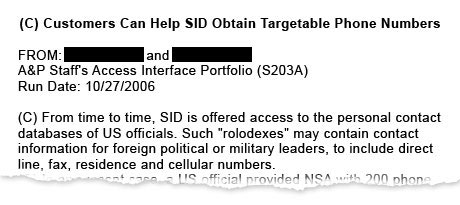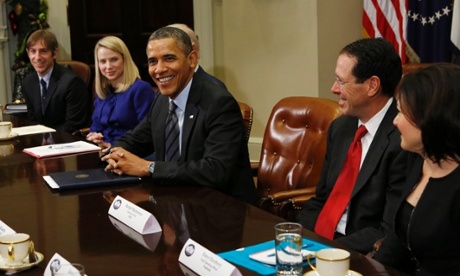 Expand
Expand
While NSA surveillance has been front and center in the news recently, fusion centers are a part of the surveillance state that deserve close scrutiny.
Fusion centers are a local arm of the so-called "intelligence community," the 17 intelligence agencies coordinated by the National Counterterrorism Center (NCTC). The government documentation around fusion centers is entirely focused on breaking down barriers between the various government agencies that collect and maintain criminal intelligence information.
Barriers between local law enforcement and the NSA are already weak. We know that the Drug Enforcement Agency gets intelligence tips from the NSA which are used in criminal investigations and prosecutions. To make matters worse, the source of these tips is camouflaged using "parallel construction," meaning that a different source for the intelligence is created to mask its classified source.
This story demonstrates what we called "one of the biggest dangers of the surveillance state: the unquenchable thirst for access to the NSA's trove of information by other law enforcement agencies." This is particularly concerning when NSA information is used domestically. Fusion centers are no different.
In fact, in early 2012, the Foreign Intelligence Surveillance Court approved the sharing of raw NSA data with the NCTC. The intelligence community overseen by the NCTC includes the Department of Homeland Security and FBI, the main federal fusion center partners. Thus, fusion centers—and even local law enforcement—could potentially be receiving unminimized NSA data. This runs counter to the distant image many people have of the NSA, and it's why focusing on fusion centers as part of the recently invigorated conversation around surveillance is important.
What are fusion centers?
Fusion centers are information centers that enable intelligence sharing between local, state, tribal, territorial, and federal agencies. They are actual physical locations that house equipment and staff who analyze and share intelligence.
How many are there?
There are 78 recognized fusion centers listed on the Department of Homeland Security (DHS) website.
Who works at fusion centers?
Fusion centers are staffed by local law enforcement and other local government employees as well as Department of Homeland Security personnel. DHS "has deployed over 90 personnel, including Intelligence Officers and Regional Directors, to the field." Staffing agreements vary from place to place. Fusion centers are often also colocated with FBI Joint Terrorism Task Forces.
What do fusion centers do?
Fusion centers enable unprecedented levels of bi-directional information sharing between state, local, tribal, and territorial agencies and the federal intelligence community. Bi-directional means that fusion centers allow local law enforcement to share information with the larger federal intelligence community, while enabling the intelligence community to share information with local law enforcement. Fusion centers allow local cops to get—and act upon—information from agencies like the FBI.
Fusion centers are also key to the National Suspicious Activity Reporting Initiative (NSI), discussed below.
What is suspicious activity reporting?
The government defines suspicious activity reporting (SAR) as "official documentation of observed behavior reasonably indicative of pre-operational planning related to terrorism or other criminal activity." SARs can be initiated by law enforcement, by private sector partners, or by "see something, say something" tips from citizens. They are then investigated by law enforcement.
What is the National Suspicious Activity Reporting Initiative?
NSI is an initiative to standardize suspicious activity reporting. The NSI was conceived in 2008, and started with an evaluation project that culminated in a January 2010 report describing how NSI would encompass all fusion centers. It appears significant progress has been made towards this goal.
The evaluation project included so-called Building Communities of Trust (BCOT) meetings which focused "on developing trust among law enforcement, fusion centers, and the communities they serve to address the challenges of crime and terrorism prevention."
BCOT "community" events involved representatives from local fusion centers, DHS, and FBI traveling to different areas and speaking to selected community representatives and civil rights advocates about NSI. These were invite only events with the clear purpose of attempting to engender community participation and garner support from potential opponents such as the ACLU.
So what's wrong with Suspicious Activity Reporting and the NSI?
SARs do no meet legally cognizable standards for search or seizure under the Fourth amendment. Normally, the government must satisfy reasonable suspicion or probable cause standards when searching a person or place or detaining someone. While SARs themselves are not a search or seizure, they are used by law enforcement to initiate investigations, or even more intrusive actions such as detentions, on the basis of evidence that does not necessarily rise to the level of probable cause or reasonable suspicion. In other words, while the standard for SAR sounds like it was written to comport with the constitutional standards for investigation already in place, it does not.
In fact, the specific set of behaviors listed in the National SAR standards include innocuous activities such as:
taking pictures or video of facilities, buildings, or infrastructure in a manner that would arouse suspicion in a reasonable person," and "demonstrating unusual interest in facilities, buildings, or infrastructure beyond mere casual or professional (e.g. engineers) interest such that a reasonable person would consider the activity suspicious. Examples include observation through binoculars, taking notes, attempting to measure distances, etc.
These standards are clearly ripe for abuse of discretion.
Do fusion centers increase racial and religious profiling?
The weak standards around SAR are particularly concerning because of the way they can lead to racial and religious profiling. SARs can originate from untrained civilians as well as law enforcement, and as one woman pointed out at a BCOT event people who might already be a little racist who are 'observing' a white man photographing a bridge are going to view it a little differently than people observing me, a woman with a hijab, photographing a bridge. The bottom line is that bias is not eliminated by so-called observed behavior standards.
Furthermore, once an investigation into a SAR has been initiated, existing law enforcement bias can come into play; SARs give law enforcement a reason to initiate contact that might not otherwise exist.
Unsurprisingly, like most tools of law enforcement, public records act requests have shown that people of color often end up being the target of SARs:
One review of SARs collected through Public Records Act requests in Los Angeles showed that 78% of SARs were filed on non-whites. An audit by the Los Angeles Police Department's Inspector General puts that number at 74%, still a shockingly high number.
A review of SARs obtained by the ACLU of Northern California also show that most of the reports demonstrate bias and are based on conjecture rather than articulable suspicion of criminal activity. Some of the particularly concerning SARs include titles like "Suspicious ME [Middle Eastern] Males Buy Several Large Pallets of Water" and "Suspicious photography of Folsom Dam by Chinese Nationals." The latter SAR resulted in police contact: "Sac[ramento] County Sheriff's Deputy contacted 3 adult Asian males who were taking photos of Folsom Dam. They were evasive when the deputy asked them for identification and said their passports were in their vehicle." Both of these SARs were entered into FBI's eGuardian database.
Not only that, there have been disturbing examples of racially biased informational bulletins coming from fusion centers. A 2009 "North Central Texas Fusion Center Prevention Awareness Bulletin" implies that tolerance towards Muslims is dangerous and that Islamic militants are using methods such as "hip-hop boutiques" and "online social networks" to indoctrinate youths in America.
Do fusion centers facilitate political repression?
Fusion centers have been used to record and share information about First Amendment protected activities in a way that aids repressive police activity and chills freedom of association.
A series of public records act requests in Massachusetts showed: "Officers monitor demonstrations, track the beliefs and internal dynamics of activist groups, and document this information with misleading criminal labels in searchable and possibly widely-shared electronic reports." The documents included intelligence reports addressing issues such internal group discussions and protest planning, and showed evidence of police contact.
For example, one report indicated that "Activists arrested for trespassing at a consulate were interviewed by three surveillance officers 'in the hopes that these activists may reach out to the officers in the future.' They were asked about their organizing efforts and for the names of other organizers."
Who oversees the National Suspicious Activity Reporting Initiative?
The NSI is led by the Program Manager for the Information Sharing Environment (PM-ISE) in collaboration with the DHS and the FBI. The ISE is "the people, projects, systems, and agencies that enable responsible information sharing for national security." The PM-ISE, currently Kshemendra Paul, oversees the development and implementation of the ISE. The position was created by the Intelligence Reform and Terrorism Prevention Act of 2004.
If this all sounds confusing, that's because it is: the entire intelligence community is a plethora of duplicative agencies with overlapping areas of responsibility.
What kind of information do fusion centers have?
Staff at fusion centers have access to a variety of databases. Not all staff have the same level of clearances, and the entire extent of what is available to fusion centers is unclear. But we do know certain facts for sure:
Fusion centers have access to the FBI's eGuardian database, an unclassified companion to the FBI's Guardian Threat Tracking System. "The Guardian and eGuardian systems . . . have a bi-directional communication ability that facilitates sharing, reporting, collaboration, and deconfliction among all law enforcement agencies."
Fusion centers also have access to DHS' Homeland Security Data Network and it's companion Homeland Security Information Network. These systems provide access to terrorism-related information residing in DoD's classified network. It is worth noting that HSIN was hacked in 2009 and was considered so problematic that it was briefly decommissioned entirely.
Fusion centers have access to other information portals including the FBI's Law Enforcement Online portal, Lexis Nexis, the Federal Protective Service portal, and Regional Information Sharing Systems .
Finally, as discussed above, we know that unminimized NSA data can be shared with the National Counterterrorism Center, which means that fusion centers could be in receipt of such data.
What federal laws apply to fusion centers?
Because they are collaborative, legal authority over fusion centers is blurred, perhaps purposefully. However, there are some federal laws that apply. The Constitution applies, and fusion centers arguably interfere with the First and Fourth Amendments.
28 Code of Federal Regulations Part 23 governs certain federal criminal intelligence systems. The "Fusion Center Guidelines . . . call for the adoption of 28 CFR Part 23 as the minimum governing principles for criminal intelligence systems." 28 CFR 23.20 requires reasonable suspicion to collect and maintain criminal intelligence and prohibits collection and maintenance of information about First Amendment protected activity "unless such information directly relates to criminal conduct or activity and there is reasonable suspicion that the subject of the information is or may be involved in criminal conduct or activity." Finally, it prohibits inclusion of any information collected in violation of local law.
Section 552(a)(e)(7) of the Privacy Act prohibits federal agencies, in this case DHS personnel who work at fusion centers, from maintaining any "record describing how any individual exercises rights guaranteed by the First Amendment unless expressly authorized by statute or by the individual about whom the record is maintained or unless pertinent to and within the scope of an authorized law enforcement activity." A 2012 U.S. Senate Permanent Subcommittee on Investigations report on fusion centers stated: "The apparent indefinite retention of cancelled intelligence reports that were determined to have raised privacy or civil liberties concerns appears contrary to DHS's own policies and the Privacy Act."
What state or local laws apply to fusion centers?
Fusion centers are sometimes bound by local and state laws. The law enforcement agencies that feed information into centers may also be restricted in terms of what information they can gather.
The Northern California Regional Intelligence Center, located in San Francisco, CA, serves as a good example of how state and local regulations can apply to a fusion center. NCRIC works with law enforcement partners around the region and stores criminal intelligence information. The California constitution has a right to privacy and California has other laws that address privacy and criminal intelligence. These should cover NCRIC.
The San Francisco Police Department's relationship with NCRIC also serves as a good example of the applicability of local laws. SFPD participates in suspicious activity reporting, but is also bound by a number of restrictions, including Department General Order 8.10, which heavily restricts intelligence gathering by the SFPD, as well as the sanctuary city ordinance, which prohibits working with immigration enforcement. While the fusion center would not be bound by these regulations on its own, the SFPD is.
Who funds fusion centers?
Fusion centers are funded by federal and state tax dollars. Estimates of exactly how much funding fusion centers get from these sources are difficult to obtain. However, there are some numbers available.
For 2014, the Homeland Security Grant Program, which is the federal grant program that funds fusion centers, has $401,346,000 available in grant funds. The grant announcement emphasizes that funding fusion centers and integrating them nationally is a high priority. This is an approximately $50 million increase over last year's allocation—somewhat shocking in light of the critiques around fusion center funding that have been raised by Congress.
A 2008 Congressional Research Service report states that the average fusion center derives 31% of its budget from the federal government. Those numbers may have changed now.
Has there been any discussion about fusion centers at the federal level?
Yes, but not enough. In October of 2012, fusion centers were the subject of an extremely critical report from the U.S. Senate Permanent Subcommittee on Investigations. The bipartisan report focused on the waste, ineptitude, and civil liberties violations at fusion centers. The report revealed that fusion centers spent tax dollarson "gadgets such as 'shirt button cameras, $6,000 laptops and big-screen televisions. One fusion center spent $45,000 on a decked-out SUV..." Regarding the information produced by fusion centers, the report noted that fusion centers produced "'intelligence' of uneven quality – oftentimes shoddy, rarely timely, sometimes endangering citizens' civil liberties and Privacy Act protections, occasionally taken from already-published public sources, and more often than not unrelated to terrorism."
This report recommended a hard look at fusion center funding, but that clearly has not happened. They are still operating across the country with federal funding. In fact, their funding has even been increased.
What about at the local level?
There are grassroots privacy advocates in multiple cities fighting to get more information about fusion centers and how their local law enforcement participates in them. These efforts have been frustrated by stonewalling of public records act requests and uneducated, or at times dishonest, public officials.
Have any regulations been passed or proposed?
To date, only one place has passed regulations around fusion centers. Berkeley, CA, passed a policy in September 2012 that the Berkeley Police Department can only submit suspicious activity reports after establishing reasonable suspicion of criminal behavior, and put in place an audit of SARs.
Massachusetts is also considering changes to fusion centers. SB 642 would strictly limit collection and dissemination of criminal intelligence information and would require a yearly audit of the Massachusetts Commonwealth Fusion Center.
What can I do?
Fusion centers are an area ripe for grassroots organizing. Groups like the StopLAPD Spying Coalition, which put together a "People's Audit" of SARs in LA, provide excellent examples of how this can happen. Public records act requests can be leveraged to get information about what your local law enforcement is doing. Grassroots organizing and education can get people and elected officials talking about this issue.
On April 10, activists across the country will be participating in "Stop the Spy Centers: a national day of action against fusion centers." These activists have three demands: 1. Shut down fusion centers, 2. De-fund fusion centers, and 3. Release all suspicious activity reports and secret files.
While April 10 is one day of action, the conversation around fusion centers must continue hand in hand with our national discourse around NSA, CIA, and FBI surveillance.
Where can I get more information about fusion centers?
This article first appeared on Electronic Frontier Foundation and is republished under Creative Commons license. Image by Tischenko Irina/Shutterstock.





 Expand
Expand